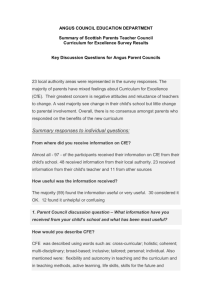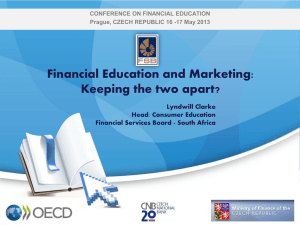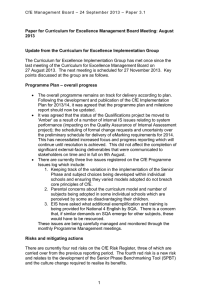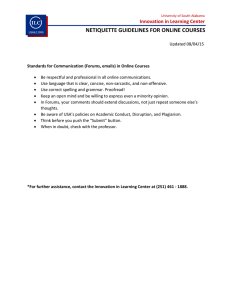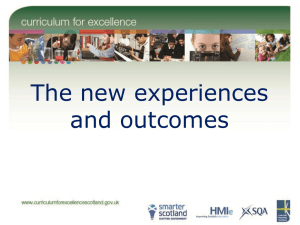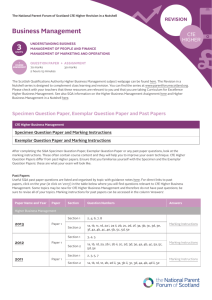A Formative Evaluation Strategy for 3-18 Learning in Scotland
advertisement
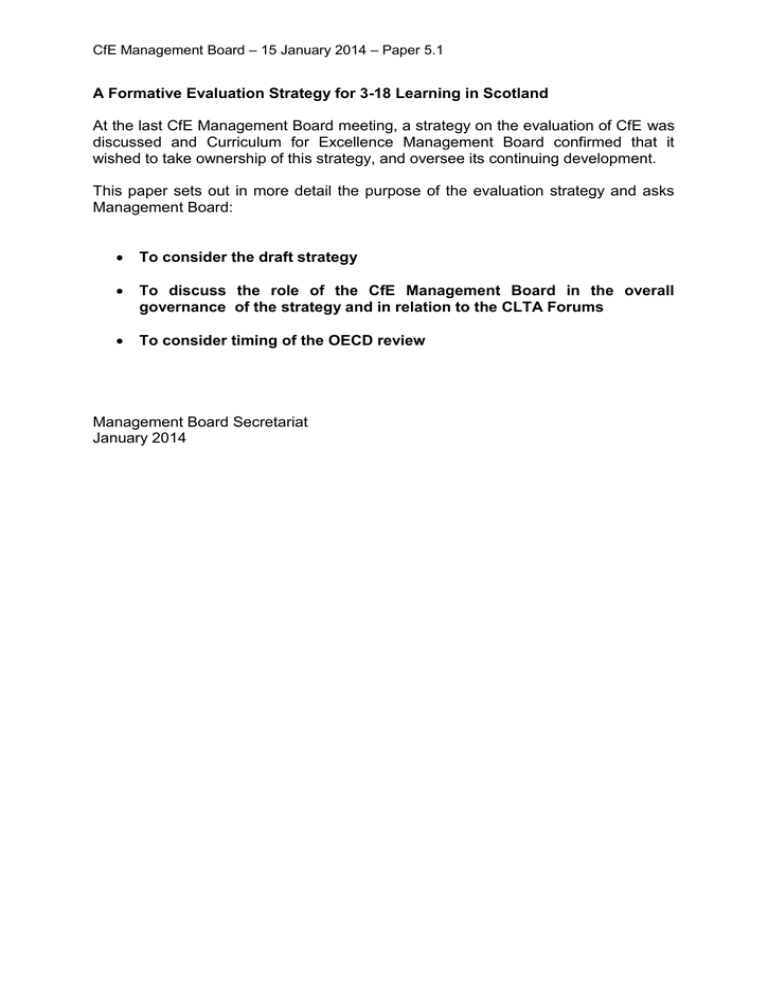
CfE Management Board – 15 January 2014 – Paper 5.1 A Formative Evaluation Strategy for 3-18 Learning in Scotland At the last CfE Management Board meeting, a strategy on the evaluation of CfE was discussed and Curriculum for Excellence Management Board confirmed that it wished to take ownership of this strategy, and oversee its continuing development. This paper sets out in more detail the purpose of the evaluation strategy and asks Management Board: To consider the draft strategy To discuss the role of the CfE Management Board in the overall governance of the strategy and in relation to the CLTA Forums To consider timing of the OECD review Management Board Secretariat January 2014 CfE Management Board – 15 January 2014 – Paper 5.1 A Formative Evaluation Strategy for 3-18 Learning in Scotland Strategy The purpose of this strategy is to ensure that Scotland’s 3-18 education system is able to learn and adapt over time, and is equipped to keep up with and respond to change and feedback from the system. The strategy will capture and evaluate the full range of activity and evidence available, and will have particular reference to Curriculum for Excellence, in terms of: the distinctive features which underpin CfE the approach to learning and teaching being implemented in Scotland’s schools the national curriculum framework national activity in support of implementation. A number of strands will contribute to this: the planned OECD review the establishment and operation of Curriculum, Learning, Teaching and Assessment (CLTA) National Forums, facilitated by Education Scotland engagement with the wider education and academic community on implementation of CfE, and the approach being taken to evaluation Analysis of existing evidence Independent research, both as part of the National Forums process, and more broadly Policy focus The key policy questions are: Outcomes Is Curriculum for Excellence achieving what it set out to achieve? Have learners experienced positive change in the way in which they learn, and has there been an improvement in terms of learners outcomes, and reducing inequality? Are learners better able to make a smooth progression throughout their learner journey, and in particular into further learning or employment? CfE framework and support Are current developments within the system having a positive impact for local authorities, schools, teachers, employers, Further and Higher Education, learners, and parents? Have practitioners been able to use the CfE policy framework to improve learning and teaching, and are they receiving appropriate support at the local and national levels? Does the system have the capacity to continue to learn and adapt? CfE Management Board – 15 January 2014 – Paper 5.1 Outcomes of evaluation Those with a stake in the system are able to draw on a strong evidence base to enable them to make improvements in their area of influence. We have a strong qualitative independent evaluation of learning under Curriculum for Excellence, which will provide a basis for ongoing review. This evidence will cover a range of parties engaged in education system, including learners, practitioners, and parents. This evaluation will offer international comparison, to enable us to continue to learn from other approaches. An established route for a range of stakeholders to maintain the relevance of the curriculum and approaches to learning, teaching and assessment in a systematic and on-going way A role for inspection evidence in informing approaches to learning and teaching, both at the system-level and within individual establishments. Impact assessment will also be built into Education Scotland’s planned interventions in their support role. A clearer understanding of gaps in our evidence base will develop as we progress, and a recognition that a range of sources are needed. Engagement with the wider community will be important here, to help us reflect on our coverage of the main aims and principles of CfE. Governance At their September meeting, the Curriculum for Excellence Management Board confirmed that it wished to take ownership of this strategy, and oversee its continuing development. Further discussion on the Board’s role would be welcome, including in relation to the key dates when input would be needed and the connections with wider consultation which has been taking place on strands of the strategy i.e. CLTA forums and OECD review Role of Royal Society of Edinburgh and the wider academic community The Scottish Government is working with the RSE Education Committee to explore how it might best support this process, by contributing to an independent research perspective. More specifically, it is proposed that the RSE Education Committee Contributes strategically to the design and progress of this strategy Helps to identify key research questions and methodologies to be addressed through this strategy Assists in the development of a specification for the OECD review – early 2014 Contributes to and comments on the background summary report being submitted to the OECD – expected September 2014 Input to the initial OECD scoping visit – possibly December 2014 Meet with the OECD during field visits phase to offer an independent perspective on the implementation of CfE – expected Spring/Summer 2015 Contribute to consultation on the specification of the CLTA National Forums – during January 2013 Assesses and advises on the research dimension to the overall strategy CfE Management Board – 15 January 2014 – Paper 5.1 This strategic role of the RSE Education Committee will sit alongside engagement with the wider academic community, for example through the CLTA National Forums. Annexes Annex A Annex B Annex C Annex D Summary of existing evidence relating to CfE produced by Scottish Government and its agencies OECD review plans Summary of plans for the Curriculum, Learning, Teaching and Assessment Forums Distinctive features of CfE – paper from the RSE Education Committee CfE Management Board – 15 January 2014 – Paper 5.1 ANNEX A Data gathered by the Scottish Government Introduction The Scottish Government Education Analytical Services Division oversees a range of analytical work generating data on the education system. Below, we have listed our key activities. The purpose of listing our main information is to illustrate the breadth and depth of information that can be used to give a picture of the education system. Within these datasets there are a number of headline indicators. The information is of two types. One is administrative data which reports both key inputs into the system (buildings, teachers, spending) and outcomes (attainment, destinations). Secondly, survey research which fills the gaps in routine data, including information on literacy and numeracy at intermediate points in schooling, international comparisons. These programmes could be supplemented by specific pieces of work filling in the evidence base, for example, qualitative research with stakeholders. The forthcoming OECD review will offer one such supplement to this base. There are also additional sources of data which will assist on considering the outcomes of the system, focusing on issues beyond just school-aged education. These include Growing Up in Scotland (GUS), the Scottish Schools Adolescent Lifestyle and Substance Use Survey (SALSUS), and the Scottish Employer Skills Survey. Education Scotland’s intelligence, inspection reports and beyond, will also offer a rich source of evidence. In considering these sources of evidence, we will need to ensure the views of all those with a stake in the system are explored. Data on outcomes Survey of Literacy and Numeracy. Annual sample survey looking alternately at literacy and numeracy in P4, P7 and S2 PISA. The OECD survey of member states and other partner countries on achievements in reading, maths and science, with questionnaires designed to be internationally comparable. Produced every three years. The 2012 data on maths attainment will be published at the end of 2013. PISA 2015 will focus on science. Routine statistical data on sustained leaver destinations (a National Indicator), and post appeals attainment (from the Scottish Qualifications Authority) Data on activity Routine statistical data school meals and PE, exclusions and attendance. CfE Management Board – 15 January 2014 – Paper 5.1 Data on processes PISA also contains data on school management practices and pupil perception. In 2012 school heads and students will be surveyed. In 2015, parents will be surveyed in addition SSLN also surveys teachers and pupils on experiences. Data on inputs Education spending by local authorities Routine statistical data on pupils, teachers and estates (Sept-Dec 2013) Education Analytical Services October 2013 CfE Management Board – 15 January 2014 – Paper 5.1 ANNEX B OECD Review Purpose The Scottish Government have agreed that the OECD will carry out a review of progress on Curriculum for Excellence, and the quality of the associated learning and teaching being provided in the schools-based education system. This is to assist and inform the system in reflecting on current strengths and weaknesses, and to provide a basis for continuing to develop priorities and practice. The OECD’s ownership of this process will ensure independence, and will provide opportunities to offer comparative evidence on wider international approaches. Their completion of the 2007 review on Quality and Equity of Schooling in Scotland will help offer a basis for this new work, provide continuity and also bring a close connection with original aims of Curriculum for Excellence and our Improving Attainment agenda. Scope The OECD work will focus on the school-based education system, but will also consider transitions to and from this. The review will be formative – implementation of Curriculum for Excellence is on-going, and this piece of work should not view the programme as complete. The Scottish Government will provide a range of policy questions to the OECD to help inform their work. Consideration is being given to a two-phased approach, which will allow for future follow-up evaluation work once the full roll-out of the new CfE qualifications is complete and the first cohorts of learners have completed their Senior Phase and made their transition beyond school. We expect the OECD’s work to involve two key stages: desk-based research and a field visit to Scotland to visit schools and gather evidence from key stakeholders. We will provide the researchers with current evidence we, and our agencies hold, to help inform this first stage. The second stage, the field research, will involve direct interaction with a range of interests, including learners, local authority officials, teachers, parents, Government and its agencies, and wider partners. CfE Management Board – 15 January 2014 – Paper 5.1 Provisional timelines In respect of the programme for CfE implementation, the following two alternative timelines for review are currently being considered. Dates are approximations, pending further planning discussions with the OECD, including on possible follow-up in 2017/18: Evaluation of learning during education/transition to senior phase Date Activity the Sep 2014 SG background report Dec 2014 OECD pre-visit Spring/Summer 2015 OECD Field Visits broad general October/November 2015 OECD Report Evaluation including the first cohort of learners completing the new Higher Qualifications Date Activity Feb 2015 SG Background Report May 2015 OECD Pre-visit Autumn 2015 OECD Field Visits Feb 2016 OECD Report CfE Management Board – 15 January 2014 – Paper 5.1 ANNEX C Curriculum, learning, teaching, assessment (CLTA) National Forums Background During the period October to December 2013, Education Scotland engaged with SG, CfE Management Board, Implementation Group and, jointly with SG, a range of partners and stakeholders. This exercise explored views on the purpose, composition, working arrangements, role of participants, and the process for setting up and running the Forums in 2014. These discussions led to the proposals outlined in this paper. 1. Response to the engagement Overall, the proposal to set up 3-18 CLTA National Forums received a positive and encouraging response and indicated that there is a wide authorising environment to progress the proposal. All groups agreed that CfE has the potential to ensure the curriculum remains relevant to learners’ needs. There was optimism that this might reduce the need for major curriculum overhaul every few years. All groups indicated their wish/willingness to be involved in the Forums in some way or other. 1.1 Overall purpose The engagement helped to clarify the purpose. As a result, the following will serve as the initial draft purpose for the first tranche of implementation. The overall purpose of the CLTA National Forums is to secure, consolidate and embed Curriculum for Excellence, maintain its relevance for all learners and ensure it is capable of delivering high-quality learner outcomes. 1.2 Timescale The engagement provided clear advice that the Forums should be phased in, with the first tranche serving as pathfinders. As a result, the Forums will be introduced in the following sequence and timescale. January – March 2014 CLTA4. 3-18 National Digital Learning Forum CLTA6. 3-18 National Expressive Arts Forum: Expressive Arts CLTA2. 8-16 National Middle Years Forum April – June 2014 Second tranche – three more Forums (to be decided) will be established. August – December 2014 Third tranche – remaining Forums to be established. CfE Management Board – 15 January 2014 – Paper 5.1 1.3 The overall structure The proposed initial structure of Forums and how they connect is shown here. CLTA1 CLTA2 CLTA3 CLTA4 CLTA5 National National National National National Early Middle Upper Digital Gaelic Years Years Years Learning Forum Forum Forum Forum Forum CLTA6 Expressive Arts 3-18 CLTA7 Health and Wellbeing 3-18 CLTA8 Languages Literacy 3-18 CLTA9 Mathematics Numeracy 3-18 CLTA10 Religious and Moral 3-18 CLTA11 Sciences 3-18 CLTA12 Social Subjects 3-18 CLTA13 Technologies 3-18 Particular features of the proposed Forum structure stemming from the engagement include the following. Broad agreement of the need to prevent proliferation of Forums for crosscutting aspects of the curriculum. CfE Management Board – 15 January 2014 – Paper 5.1 Broad agreement that Forums should be established for each of the 3-18 curriculum areas in line with the structure in CfE, with separate Forums for Gaelic and for Glow/Digital Learning. The proposal for 3 x stage Forums rather than conventional sector Forums received strong support. These Forums will need to ensure that full attention is given to cross-cutting aspects of the curriculum, specific aspects of delivery, and wider contexts of provision. The structure is also intended to help ensure transitions across sector interfaces are improved. Examples of these crosscutting aspects include literacy, numeracy, and health and wellbeing. Request that Forums be both physical and virtual communities. 3-18 joined-up curriculum areas to promote the learner journey in a seamless way Preference for ‘hard-wiring’ of key aspects of provision into the main Forum structure, including for example parental involvement, CLD, ASN/special, as facilitated by the design of CfE, and overlapping learner journey Forums to reduce the risk of compartmentalized working 1.4 Membership Through discussions on membership, agreement emerged around the following. Broad agreement that a ‘person specification’ should be used to ensure membership of Forums meets the requirements of purpose. Broad agreement that a membership pool should be created to ensure all stakeholders and partners can be appropriately represented within the totality of the Forums, whilst not necessarily in each one. General recognition that Forums might draw from nominees from a range of partner/stakeholder groups, alongside invited specialists as appropriate, and with expressions of interest being opened up to the wide education community. Agreement that recruitment to the Forums should be on the basis of interview for suitability against the person specification. General recognition that the Forums will require a small standing group representing key agencies. General agreement that membership for each individual Forum should be around 15, and based on a core group and a phased, rolling membership structure. Forums should have key partners at the core, including SG policy, ES, SQA and ADES 2. Proposals for January – June 2014 Proposed actions for the first half of 2014 are outlined in this section. Detailed milestones will be built in early 2014 from these proposed actions. 2.1 Further engagement Discussions with further groups of partners and stakeholders will take place. These will continue to be formative and are likely to have influence on the present proposals, their implementation, and on the authorising environment. The first of these will be on 13th January with the RSE Education Committee. CfE Management Board – 15 January 2014 – Paper 5.1 The possibility of a small symposium to consider membership of Forums and to help draw up the person specification is being explored. 2.2 First meetings Establishment and meeting of a steering group in early January to consider the process outlined in this paper and to make arrangements to oversee the process thereafter, reporting to CfE Implementation Group and Management Board. The precise composition of the steering group is to be determined. Inaugural meetings of the core standing groups for the first tranche of 3 Forums will be held in January. These meetings will be called by the lead Education Scotland Senior Education Officers for the curriculum areas. The initial core group, facilitated by an Assistant Director, will design the implementation pathway for the Forum. These inaugural meetings will make recommendations to the steering group as follows. The person specification The preferred blend of membership from the three sources described above, including any specific requirements of the particular Forum Timescales for recruitment and next steps towards recruitment Topical features of national implementation in the context of the Forum Preparation of a structure for a draft remit, and commissioning of the draft remit Risks Recruitment plan Next steps and milestones. 2.3 Recruitment A draft person specification will be prepared in January 2014 and will be used for an initial call for nominations from key stakeholder and partner groups, for a national call for expressions of interest, and to underpin invitations to identified specialists. A programme of recruitment will be carried out during February. The first meetings of the 3 Forums will be held in March 2014. 3. Opening agenda themes As well as exploring operational aspects of the new Forum, initial meetings of Forums will be asked to consider the following themes, and thereafter to consider how the Forum proposes to take them forward. These questions will be refined and firmed up during the early part of 2014 through further engagements with key stakeholders and partners. Progress towards securing a joined-up 3-18 curriculum Progress towards improved learning, teaching and assessment based on learners’ individual and collective needs Progress towards securing better outcomes for all learners and reducing inequity in outcomes for disadvantaged and vulnerable groups The impact of innovation, opportunities, challenges and perceived constraints CfE Management Board – 15 January 2014 – Paper 5.1 The suitability of the evidence base on which the Forum can base its work, and what needs to be done to ensure robust breadth and triangulation of evidence Progress towards building confidence in Scottish education through CfE The usefulness of advice and materials provided locally and nationally Key strengths and areas for development CfE Management Board – 15 January 2014 – Paper 5.1 ANNEX D Consideration of distinctive and innovative features – paper from the Royal Society of Edinburgh In framing the evaluation, the original aims and intentions of Curriculum for Excellence need to be borne in mind. This will assist with considerations on whether the intended outcomes of CfE are being achieved. In line with the agreed role of the Royal Society of Edinburgh’s Education Committee to assist with designing the evaluation strategy, we have been discussing with them the key aspects on CfE which should be explored. The following RSE contribution offers thoughts on the elements of CfE which should be included specifications for evaluation work, including for the OECD review. ___________________________________________________________________ Any external evaluation of Curriculum for Excellence clearly has to focus on trying to establish whether CfE has served to raise standards in Scottish schools and whether it has helped to ‘narrow the gap’. In other words, it is bound to pay considerable attention to analysing trends in attainment and achievement and seeking to determine whether these have been affected by changes that form part of the implementation of the new curriculum. The evaluation must consider some of the more important components of CfE and seek to determine what role, if any, they have played in bringing about the changes that have been observed. However, it is evidently of greatest interest to look at the contribution of those elements of CfE that are innovative and distinctive. This will not merely be important to those in other countries that are watching CfE with a view to perhaps adopting some aspects of it but, more significant from a Scottish perspective, it will allow some estimation of how successfully innovative features have been introduced and whether or not these have added value to the enterprise. CfE comprises a significant number of elements that might be considered as falling into this category. The following could be considered for inclusion: 1. Curriculum Adoption of a limited number of long-term strategic objectives (the so-called four capacities) The attempt to define the curriculum in terms of learning experiences and expected outcomes for the pupil (the Es and Os) The use of curriculum principles, especially, personalization and choice, depth, challenge and enjoyment An increased focus on the development of skills, especially advanced cognitive skills A balance between subject-based and interdisciplinary activity An enhanced value placed on learning outwith school (with implications for partnership working) CfE Management Board – 15 January 2014 – Paper 5.1 2. The nature of learning Constructivist pedagogy or, in the terms of CfE, ‘active learning’ Improved continuity across transitions (pre-five to primary, primary to secondary and secondary to various positive destinations) with consequent requirements for improved partnership working Learner engagement Although significant, the following aspects are not especially distinctive or innovative. Rather, they reflect more familiar educational intentions. Given the need to keep the exercise manageable, it would seem appropriate to focus on the items under 1 and 2, above, but accepting the need to remain vigilant on the matters below. 3. Learning pathways Phases of education (broad general and senior), within the context of a continuum of learning from 3-18 Establishment of pupil entitlements The development of new national qualifications Improvements in assessment approaches Keir Bloomer, 10.11.13
